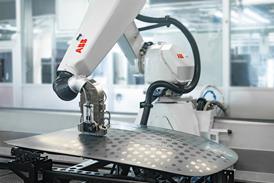
This year’s Laser World of Photonics events – to be held in Shanghai, March 19-21 and Munich, May 13-16 – will showcase technological developments in laser-based production
With Laser World of Photonics events taking place in China and India, the parent Munich event, now in its second year, will offer an insight into one of the more exciting and innovative areas of technological development.
Organisers claim that photonicenabled laser-based production is set to revolutionise production engineering by way of laser-based ‘additive manufacturing’ where complexity and individuality can be accommodated without cost penalties, thereby challenging the traditional quantity/cost relationship. For the automotive sector this has a particular resonance, with the constant trends for product diversity and increasing complexity.
At the last Laser World of Photonics in Munich, in 2011, over 1,000 companies from 38 countries exhibited to nearly 30,000 visitors from 80 countries. The Congress programme alone attracted around 5,000 people. The photonics industry is seen as a key enabler of economic progress. Its leveraging effect, via its impact on other industries, has been studied both in Europe and in Asia, with governments keen to promote its development as a catalyst of advanced industrial progress.
Within manufacturing processes, laser technology is widely adopted for process and quality control, while ever more sophisticated applications are finding their way into automotive production. Primes GmbH, for example, will display sophisticated beam diagnostic systems for use in a variety of automated quality assurance systems. Recent applications, such as the incorporation of lasers in headlamp systems by BMW and other manufacturers, are perhaps only the most obvious – dynamic light spot technology and anti-dazzle high beam assist systems that reduce glare are all under development. Less exciting perhaps – but in many ways as crucial to vehicle production and efficiency – are the myriad laser photonic systems utilised in component marking and identification. CAB Produkttechnik GmbH will be among those showing the range of laser marking applications which will be relevant to automotive production. Over the years, manufacturers have moved from dot pin, electro-etching and ink jet marking to laser marking, which is now being the preferred method in almost every automotive application. Scanlab AG will be exhibiting its range of integrated laser processing systems which have self-aligning functionality and applications in a range of settings, including display and switchgear backlighting.
At the other end of the scale, the possibilities for laser ignition remain moot as current spark plug technologies are well able to deal with automotive requirements. Yet future development of lean combustion, involving dramatic increases in compression ratios, could direct future attention towards laser applications.
Optical metrology will feature prominently at Munich in 2013, with the SPIE Optical Metrology Conference taking place as part of the World of Photonics Congress. Displays on optical measurement for industrial inspection will include metrology modeling and automatic visual inspection tasks. ERLAS Erlanger Lasertechnik GmbH will be among key exhibitors showing the potential of laser techniques in cutting, welding and material processing.
Other processes of interest to the automotive sector will include Selective Laser Melting (SLM) in which complex components can be produced in a range of materials using a single selective laser melting process. Complex shapes and optimised low weight components can be generated on a programmed individualised basis at little or no additional cost.
These cluster of process combine to offer production which is both automated and individualised. When conventional production processes are used, complexity and small batch production are accompanied by high unit costs. However, using additive techniques in digital opthonic production neither factor has significant impact on costs, opening a whole new level of opportunity to designers and product planners. Systems create workpieces directly from CAD data, and the conventional tools and dies are replaced by laser light. The result is a whole new perspective on automated manufacturing with completely new photonics process chains.
Application panels will lead discussions on the potential of these techniques in different manufacturing environments. Experts from Fraunhofer ILT and BMW Group will be presenting sessions of interest to colleagues from the automotive industry
The significance of the laser additive process lies also in the mechanical properties of the resulting components. With laser metal deposition it is possible to use typical casting materials, resulting in components produced by a layering process but with comparable physical properties to the base material. The almost unlimited geometric freedom of this method allows the production of single complex components. Rather than large numbers of individual items, that then have to be assembled, laser additive process production allows the generation of a single complex component to take their place. Delegates will have the opportunity to see numerous applications of this process and discuss with experts the potential for their own areas of activity.
Laser technology is influencing traditional machine building as well as the components that are produced. Addressing the problems of life limitations of forging dies, researchers in Germany have utilised lasers to alter the metallurgical surface properties on forging dies. By controlling and modifying the hardness gradient of the die’s surface, its wear resistance and impact absorption can be adjusted to ensure long life. Their work will be on display in Munich this year and is sure to attract interest from those involved in automotive. Elsewhere, thin film coatings are transforming the characteristics of traditional materials and Evochem Advanced Materials GmbH will be one of a number of specialist companies demonstrating the potential of coating technologies.
 Major machine builders and robotics specialists will be represented at Munich as they seek to ensure they can integrate their products into a changing technological environment. Reis Robotics, for example, offers a broad product range of industrial robots encompassing welding, casting, handling, and laser robots, along with, peripheral modules and services for automation solutions in all major application fields. Incorporated in these solutions are ever more sophisticated sensor technologies. Other exhibitors familiar to those in automotive include Laserline, one of the pioneers in the world of diode lasers for industrial materials processing. SITEC Industrietechnologie GmbH will also be displaying its range of laser machining equipment, from standalone solutions to fully integrated systems based on their Variomodul concept.
Major machine builders and robotics specialists will be represented at Munich as they seek to ensure they can integrate their products into a changing technological environment. Reis Robotics, for example, offers a broad product range of industrial robots encompassing welding, casting, handling, and laser robots, along with, peripheral modules and services for automation solutions in all major application fields. Incorporated in these solutions are ever more sophisticated sensor technologies. Other exhibitors familiar to those in automotive include Laserline, one of the pioneers in the world of diode lasers for industrial materials processing. SITEC Industrietechnologie GmbH will also be displaying its range of laser machining equipment, from standalone solutions to fully integrated systems based on their Variomodul concept.
Small companies and niche product
For many exhibitors at Laser world of Photonics 2013 their attendance is facilitated by a national trade body or economic development association. The result is a plethora of very small companies with niche products participating. With new technologies the real growth can often come from small companies spun off from academic research.
Alternatively they can build on the expertise and experience of individuals who have pioneered a particular application. CAM-Service GmbH, for example, will display its Cagila CNC programming software for laser, plasma or water jet cutting applications after a decade-long growth from its origins as a spin-off from the Hannover Laser Centre. It is such depth of representation which the organisers hope will allow the 2013 Munich event to function as an essential catalyst for industry professionals.































